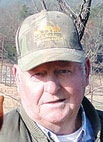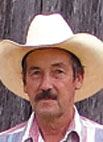
Don Smith of Hogden, Okla., was raised in Kiowa, home of famous country-western singer and TV personality Reba McEntire. In fact, Reba and Don are cousins with Reba’s father, Clark, being a major influence in Don becoming a professional cowboy and in meeting his wife. Don and Susan met at a rodeo in Wilburton, Okla., where both were competing and with both eventually becoming professional cowboys.
The year 2010 was a good competitive year for the Smiths. Susan won barrel racing at the Denver National Fat Stock Show and Rodeo while Don walked away with the new Dodge Dually by winning the U.S. Team Roping Championship and the #10 Gold Plus after winning a rope off against his partner Anthony Echelle. The Smiths have five competitive horses. Don said, “I used to train horses and prefer to buy a young one after I have ridden it to test for compatibility and suitability. It’s cheaper that way and I know exactly how the horse has been trained.”
Don ropes, raises roping stock and chickens and grows and harvests all of his hay. Because of his love of roping and with more work than he could handle because of raising both commercial cattle and chickens, Don decided to transition his commercial herd to a roping stock herd in 2010. According to Don, his commercial herd had been mostly Charolais because, “They looked pretty, had a gentle temperament and brought top dollar at the McAllister market.” At its peak, Don’s commercial herd contained 150 pairs. When he transitioned, he kept the heifers for replacement roping stock and bought two Longhorn bulls and Longhorn influenced mommas. The herd now consists of 40 mommas which run on 150 acres of pasture. According to Don, the bull calves are not castrated until they are weaned because the horns grow better. The roping stock are kept until they are “used up,” meaning they become too big for the chutes, run in predictable patterns, or refuse to run when roped and have to be dragged. At that time, the heifers become part of the breeding stock and the steers are marketed.
The chicken farm consists of four houses on 30 acres. The first chicks arrived on Thanksgiving Day in 1989. In preparation, local Mennonites built the four houses so strongly that the houses are in better shape than many half their age. Don said, “The houses are extremely solid with probably only four knots in the wood in an entire house.” That sturdiness, however, makes constant retrofitting the biggest challenge for the chicken farm. Nonetheless, the houses are completely up-to-date including computer systems and cold cell cooling supported by 48 inch fans. Don said, “The chickens have been a perfect job for me because I like being my own boss and hate punching a clock on somebody else’s time.”
One of the reasons Don’s time demand is so heavy is that he cleans out his own houses and then sprays and readies them for the next batch of chicks, which will become 46-day-old, 6-pound, antibiotic-free chickens for OK Foods. The 14 day rest period between flocks is a very busy time for Don because each task is time-consuming. Clean out for each house takes about a day and all of the feed and water lines have to be lowered to accommodate the new chicks only to be raised again every two or three days after the chicks arrive to keep up with their rapid growth.
One advantage of doing his own cleanout is that Don always has chicken litter for his 50-acre Bermuda hay field, which he fertilizes once a year in order to maintain a 15 percent protein level. He also sprays for weeds twice a year. The system is efficient because he neither buys nor sells hay or chicken litter.
Spraying for black beetles and fire ants in the chicken houses is effective in preventing the beetles from getting into the insulation and the fire ants from hurting the chickens. However, Don believes that fire ants are serious issue in Oklahoma with hills not only making his pastures look like a bumpy road but also invading cities, like Oklahoma City, where big mounds litter the curbs. While spraying works for chicken houses and the surrounding area, it is completely cost prohibitive for pastures. Don said, “I am looking forward to productive research to help ranchers and farmers find a way to control fire ants because they are a serious problem for my horses as well as my cattle and their calves. Sometimes the animals, especially calves, don’t avoid fire ant mounds which is very stressful for them.”







